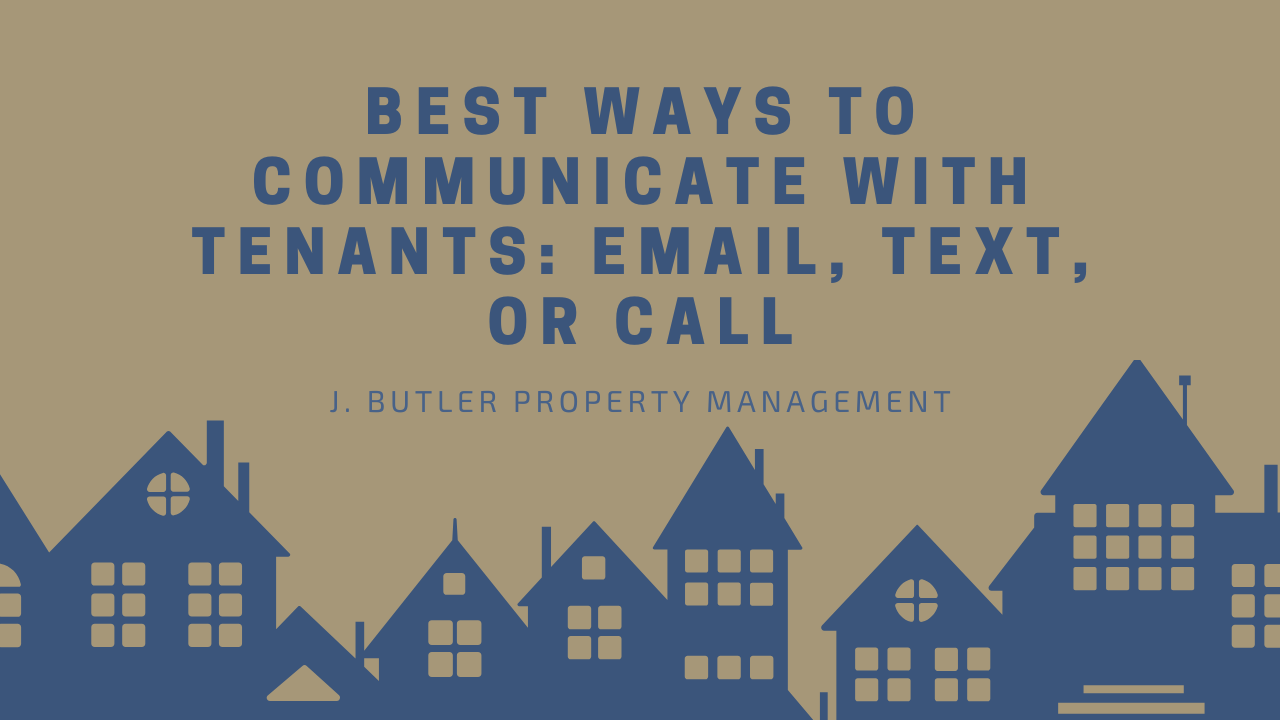
Best Ways to Communicate With Tenants: Email, Text, or Call
July 30, 2025
Best Ways to Communicate With Tenants: Email, Text, or Call
Key Takeaways
- – Good communication keeps tenants happy and helps things run more smoothly.
- – Email, text, and phone calls each have their place depending on the situation.
- – Email is great for formal updates, texts are perfect for quick reminders, and phone calls work best for urgent or sensitive topics.
Effective communication is one of the most important aspects of managing rental properties. Studies show that poor communication is a leading cause of conflict between landlords and tenants, often resulting in late rent payments, maintenance delays, and unnecessary turnover. Clear, timely messages can prevent confusion, keep tenants satisfied, and protect landlords from legal problems.
Every landlord wants to maintain good relationships with tenants, and choosing the right method of communication is key. But with several options like email, text, and phone calls, it can be hard to know what works best. Each method has benefits and drawbacks depending on the situation. To help landlords make informed decisions, J. Butler Property Management put together this article to break down each communication method.
Choosing the Right Communication Method: Pros and Cons
Choosing how to reach out to tenants should not be random. Different situations may call for different tools. Below is a comparison of email, text messaging, and phone calls to help landlords decide what to use and when.
1. Email: Best for Record-Keeping and Formal Notices
Email is one of the most reliable methods when it comes to sharing important details. It allows landlords to communicate clearly and maintain written records. Emails are useful when sending rent reminders, lease agreements, policy changes, or maintenance notices.
Advantages of Email
- – Written documentation: Emails create a record of communication that can be useful if legal issues arise.
- – Professional tone: Emails tend to promote a more business-like tone, which helps maintain boundaries.
- – Can include attachments: Documents, photos, or instructions can be sent easily.
- – Time-stamped messages: Each email has a date and time, which helps track communication history.
- – Easy to organize: Email threads allow landlords to keep conversations grouped by topic or tenant.
- – Accessible from multiple devices: Emails can be checked from phones, tablets, or computers.

Disadvantages of Email
- – Delayed response: Not all tenants check email regularly. Messages may go unread for hours or even days.
- – Less personal: Tenants may feel emails are too formal for simple questions or issues.
- – Risk of being missed in spam: Sometimes important emails are filtered out and never seen.
- – Lack of urgency: Tenants may not feel a need to respond quickly.
- – Requires internet access: If a tenant does not have consistent access, communication may be delayed.
- – Longer format: Some messages may be too detailed for quick reading, leading to misunderstandings.
2. Text Messages: Best for Quick Updates and Reminders
Texting is fast and convenient, which makes it great for sending short messages or reminders. Most people carry their phones at all times and respond quickly to texts. This method is ideal for day-to-day communication.
Advantages of Text Messages
- – Immediate delivery: Texts are usually read within minutes of being received.
- – Saves time: Sending a quick message avoids longer phone calls or formal emails.
- – Tenants are more likely to reply: People tend to reply to texts faster than emails.
- – Ideal for real-time updates: Great for informing tenants about workers arriving or water shut-offs.
- – Simple and brief: Encourages clear and direct messaging.
- – No login needed: Unlike email, texts don’t require logging into a platform.

Disadvantages of Text Messages
- – Not ideal for complex topics: If a message is too long, texting becomes confusing.
- – No official record: Screenshots can be used, but texts are not considered official documents in some legal settings.
- – Can feel too informal: If boundaries are not set early, some tenants may overuse texting.
- – Message limits: Some phone plans may limit the number of texts or include fees.
- – Harder to track: Text chains can become disorganized quickly without a clear history.
- – Can be intrusive: Tenants might feel uncomfortable receiving texts outside of business hours.
3. Phone Calls: Best for Urgent or Sensitive Conversations
Phone calls allow landlords to connect with tenants in real time, making it easier to discuss complicated or emotional matters. Calls are best when there is an emergency, a misunderstanding, or an issue that needs immediate attention.
Advantages of Phone Calls
- – Direct conversation: Speaking live can prevent confusion and allow both parties to ask questions.
- – Builds trust: Hearing someone’s voice can create a sense of connection and mutual understanding.
- – Faster resolution: A quick phone call can solve a problem that might take days via email.
- – Good for tone: Voice communication helps avoid misinterpretation of written words.
- – Two-way clarity: Landlords can confirm that the tenant fully understands expectations.
- – Ideal for some tenants: Some people prefer phone conversations over written communication.

Disadvantages of Phone Calls
- – No written record: Unless documented later, calls leave no paper trail.
- – Missed calls or voicemails: Not everyone answers calls, and returning messages takes time.
- – Time-consuming: Calls can take longer and interrupt a busy schedule.
- – Harder to manage at scale: Calling every tenant isn’t practical for large portfolios.
- – Miscommunication risk: Details might be forgotten if not followed up in writing.
- – Unwelcome calls: Some tenants may find unexpected calls stressful or invasive.
Matching Communication to the Situation
The method of communication should match the purpose. For instance, use email when you need a documented message, use texts for simple reminders, and choose calls for urgent or personal issues. Setting clear expectations with tenants at the beginning of a lease can also help.
Landlords should let tenants know which methods will be used and during what hours they can expect to hear back. Landlords should also consider tenant preferences. Some tenants may feel more comfortable texting, while others may want emails for everything. Flexibility can improve tenant satisfaction and avoid misunderstandings.
Bottom Line
Clear communication makes property management easier and reduces stress for both landlords and tenants. Email is best for official messages and documents, texts are useful for short reminders, and phone calls are ideal for urgent or sensitive topics. No single method is right for every situation, and smart landlords will use each one when it makes the most sense.
J. Butler Property Management understands the importance of timely and effective communication with tenants. Our team uses the right communication tools for every situation to help landlords stay informed, reduce turnover, and keep tenants satisfied. Whether you manage one unit or a large portfolio, we are here to support your goals.


